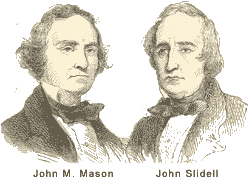The Trend Affair was the first major diplomatic crisis in the administration of Abraham Lincoln. On November 7, 1861, two Confederate commissioners, John Slidell and James M. Mason, set sail from Havana, Cuba, on the British mail steamer Trent, on their way to Britain and France on diplomatic missions. The following day, the USS San Jacinto stopped the Trent on the high seas. The American captain, Charles Wilkes, authorized the removal of Slidell and Mason and transported them to Boston. The jailing of these Southern representatives in Boston made Wilkes a hero in the eyes of many Northerners, but it sparked a serious strain on the relationship with the British.
 Under international conventions, the Trent and its passengers should have been brought into port where the matter would be adjudicated before an admiralty court.
For a number of weeks there was loose talk of war on both sides. The Times of London led the agitation with strong language denouncing the insult which, in British eyes, clearly violated international law. It appeared that Britain was on the verge of recognizing the Confederacy and declaring war on the Union. Passions eventually cooled and on December 26, Charles Francis Adams, the United States ambassador to Britain, was able to announce that Mason and Slidell had been "cheerfully liberated."
In fact, although popular in some circles, Captain Wilkes` actions had not been authorized and, in Adams` view, the conclusion of the affair was the correct one. "The extension of the rights of neutrals on the ocean and the protection of them against the arbitrary exercise of mere power," he wrote, "have been cardinal principles in the system of American statesmen ever since the foundation of the Government."
Under international conventions, the Trent and its passengers should have been brought into port where the matter would be adjudicated before an admiralty court.
For a number of weeks there was loose talk of war on both sides. The Times of London led the agitation with strong language denouncing the insult which, in British eyes, clearly violated international law. It appeared that Britain was on the verge of recognizing the Confederacy and declaring war on the Union. Passions eventually cooled and on December 26, Charles Francis Adams, the United States ambassador to Britain, was able to announce that Mason and Slidell had been "cheerfully liberated."
In fact, although popular in some circles, Captain Wilkes` actions had not been authorized and, in Adams` view, the conclusion of the affair was the correct one. "The extension of the rights of neutrals on the ocean and the protection of them against the arbitrary exercise of mere power," he wrote, "have been cardinal principles in the system of American statesmen ever since the foundation of the Government."